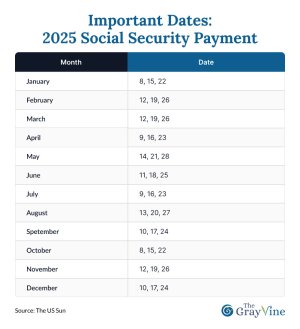Millions could face long delays in Social Security checks as internal shifts trigger major shake-up
- Replies 1
Millions of Americans may be in for a rough ride when it comes to their monthly benefits.
Internal adjustments at a key federal agency are shifting priorities and stretching resources thin.
While some of these changes could mean larger checks for certain retirees, others might bring frustrating delays.
The transition is happening fast—and not without consequence.
But the boost comes at a price. The agency handling these benefits was originally planning to process the changes by November, but leadership has now moved up the deadline to July 1. To meet that goal, workers are being pushed into overtime, including weekends, to comb through more than 900,000 complicated cases that require manual updates.
Despite promises from federal leadership that other services won’t suffer, employees say otherwise. Routine but essential updates like changing your address, fixing a banking error, or resolving a Medicare billing issue are being put off. And when those fall through the cracks, your payment might be delayed—or worse, stopped altogether.

Adding to the pressure, the agency is also reducing its workforce by about 7,000 positions (12%), aiming for just 50,000 employees overall. With fewer hands on deck, wait times are expected to climb sharply.
Staff say the directive is clear: priority goes to Fairness Act claims, new applications, and appeals. Everyone else may be told to call back later—even if it's just to update a direct deposit or get help with a billing issue. Calls to the agency average around 400,000 daily, making help harder to come by for many.
These stricter rules are raising concerns among advocates for seniors and the disabled. And for those who lack internet access or are not tech-savvy enough to use online portals, even basic updates may be out of reach.
Also read: Could you be owed money from Social Security? Here’s what to know about the 2.5 million payments being sent out
In a push to modernize, the agency has been introducing new technology. But the rollout has seen hiccups, including widespread website outages and system failures. These glitches have left people locked out of their accounts or stuck waiting for answers that never come.
The goal is faster service. The result, at least for now, is more confusion. And with fewer staff and more complicated cases to process, these digital setbacks couldn’t have come at a worse time.
This could affect not just retirees, but also over 71 million Americans relying on Medicaid, as delays in Social Security systems may spill over into healthcare services.
It’s never too early or too late to explore additional income options.
Also read: New Social Security feature could save you time—but there’s a catch
Read next: Could your Social Security benefits increase? Here’s the latest from Congress

Have you faced longer wait times recently? Are your payments arriving late? What challenges have you had when trying to update your info or speak to a representative? Drop a comment below and help others in our community stay informed and prepared.
Internal adjustments at a key federal agency are shifting priorities and stretching resources thin.
While some of these changes could mean larger checks for certain retirees, others might bring frustrating delays.
The transition is happening fast—and not without consequence.
A new law brings big benefits—but a big burden, too
A recent law overhaul has repealed two long-standing rules that used to reduce benefits for those who received a government pension. Thanks to the Social Security Fairness Act, many public sector workers are now eligible for higher payments—or even their first-ever Social Security benefit.But the boost comes at a price. The agency handling these benefits was originally planning to process the changes by November, but leadership has now moved up the deadline to July 1. To meet that goal, workers are being pushed into overtime, including weekends, to comb through more than 900,000 complicated cases that require manual updates.
Despite promises from federal leadership that other services won’t suffer, employees say otherwise. Routine but essential updates like changing your address, fixing a banking error, or resolving a Medicare billing issue are being put off. And when those fall through the cracks, your payment might be delayed—or worse, stopped altogether.

Millions could face long delays in Social Security checks as internal shifts trigger major shake-up. Image Source: Pixabay / Pexels
Adding to the pressure, the agency is also reducing its workforce by about 7,000 positions (12%), aiming for just 50,000 employees overall. With fewer hands on deck, wait times are expected to climb sharply.
Staff say the directive is clear: priority goes to Fairness Act claims, new applications, and appeals. Everyone else may be told to call back later—even if it's just to update a direct deposit or get help with a billing issue. Calls to the agency average around 400,000 daily, making help harder to come by for many.
New identity rules could delay access for the most vulnerable
Beginning April 14, if you can’t complete certain tasks online, you’ll have to visit a local office to verify your identity. This change is meant to crack down on fraud. But for people without proper documents, mobility support, or reliable transportation, it might mean more barriers to getting what they’re owed.These stricter rules are raising concerns among advocates for seniors and the disabled. And for those who lack internet access or are not tech-savvy enough to use online portals, even basic updates may be out of reach.
Also read: Could you be owed money from Social Security? Here’s what to know about the 2.5 million payments being sent out
In a push to modernize, the agency has been introducing new technology. But the rollout has seen hiccups, including widespread website outages and system failures. These glitches have left people locked out of their accounts or stuck waiting for answers that never come.
The goal is faster service. The result, at least for now, is more confusion. And with fewer staff and more complicated cases to process, these digital setbacks couldn’t have come at a worse time.
What this means for your monthly benefits
If you need to update your information or resolve a billing problem, brace yourself for longer delays. Most agency reps have been told to focus only on Fairness Act claims, new applications, and appeals. Anything else is being deprioritized.This could affect not just retirees, but also over 71 million Americans relying on Medicaid, as delays in Social Security systems may spill over into healthcare services.
Consider back-up plans for your retirement
The future of these systems remains uncertain. That’s why experts recommend taking control where you can. Retirement savings through 401(k)s and IRAs are a strong foundation. Even part-time work or downsizing could help stretch your budget if payments are delayed.It’s never too early or too late to explore additional income options.
Also read: New Social Security feature could save you time—but there’s a catch
Important dates for 2025
Social Security checks are typically issued on the second, third, and fourth Wednesday of each month. Here’s the full 2025 payment schedule to mark down:Read next: Could your Social Security benefits increase? Here’s the latest from Congress
Key Takeaways
- The Social Security Fairness Act eliminated two long-standing policies, leading to a huge new workload and possible delays for others.
- The agency is slashing staff by 12%, limiting availability for non-priority services like updating addresses or fixing payment issues.
- New ID rules require in-person verification for some tasks, which may disadvantage those without mobility or tech access.
- Tech glitches and shifting priorities could create confusion and delays for the millions relying on monthly checks.







